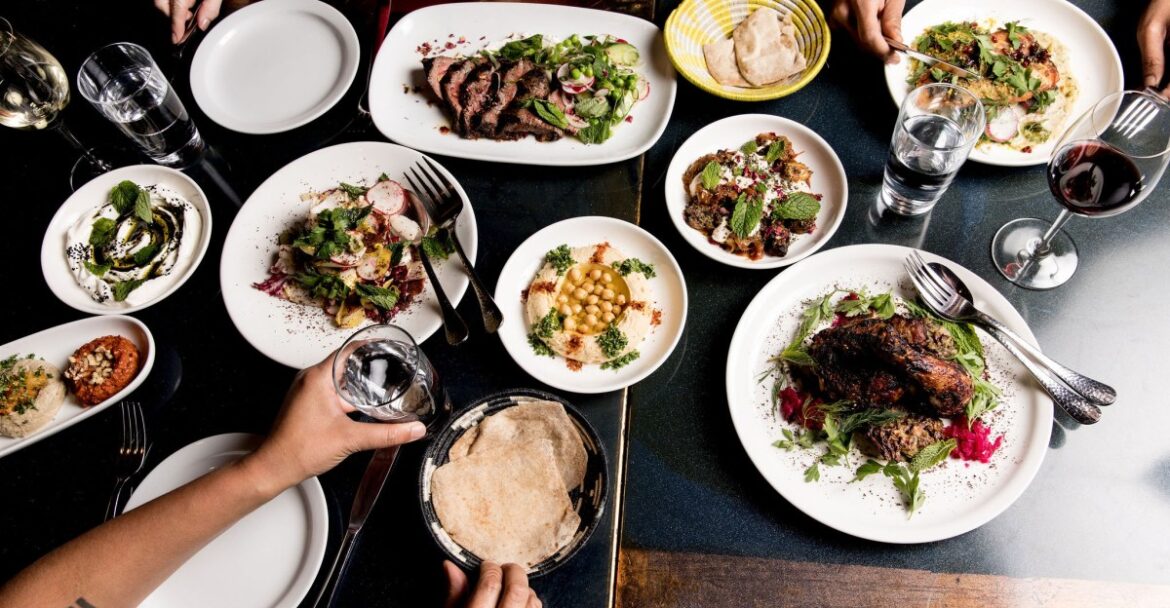Mamnoon, the flagship of the Mama restaurant group, is closing after 12 years, ownership announced on Monday, August 25. Its last day of service will be Sunday, September 14.
When owners Racha and Wassef Haroun opened Mamnoon in 2013, it was a celebration of the cuisines of Iran, Lebanon, and Syria, reflecting the Harouns’ backgrounds. They were first-time restaurant owners, but they created an instant hit. Seattle Met named it the restaurant of the year, praising its mana’eesh flatbreads, sayadieh (roasted halibut over smoked green wheat), and spicy-sweet muhammara spread. As the Harouns wrote in a goodbye letter posted to Instagram, Syria was consumed by civil war at the time, which meant “our family couldn’t travel back and mamnoon became our new haven — peering into the past and future— that couldn’t wait to welcome you into.”
The Haroun family gradually expanded into a restaurant group that included the South Lake Union rooftop spot Mbar, the Eastside restaurant Hanoon, and a place next to the Amazon Spheres that has run through several names and concepts but won praise last year from the Seattle Times for its mashup of Lebanese and Mexican cuisines. But Mama group has shrunk in the last few months: Hanoon closed earlier this summer, and the Mexican influence is off the menu at the Amazon-adjacent restaurant, now called Mamnoon Street. Meanwhile, the company has pivoted to selling its mezze, sauces, and chips in upscale grocery stores in the Seattle area.
The goodbye announcement said that “Mamnoon’s end is the rule rather than the exception in our business in Seattle,” a reference to the difficult economic climate for restaurants at the moment. There have been several notable closure announcements in the last couple of months, including Stateside and the Whale Wins. “A restaurant like mamnoon needs a healthy urban environment with diversity in all dimensions, density, spontaneity and predictability,” the owners wrote. “Alas, the last 2 years has seen scary declines in all of these, in addition to increasing costs.”
Wassef says that the closure was due to factors beyond Mamnoon’s control. It’s an unusual restaurant for Seattle — relatively large, at 120 indoor seats, and with a “muscular” menu that includes everything from affordable happy hour bites to fine-dining-style prix fixe meals. It also serves dishes that take a major amount of prep. For all that to work, Wassef tells Eater Seattle, it needs a high volume of customers. That formula was working in the 2010s, when Seattle was rapidly growing, but as that growth slowed, and more people in the metro area decamped to outlying cities and suburbs, Mamnoon’s customer base shrank. “You take Mamnoon into Manhattan, it would be thriving,” Wassef says.
The other problem is that starting in 2024, business became suddenly volatile — reservations might spike on a random Wednesday, followed by unexpectedly slow weekend nights. “Because we couldn’t predict it, we couldn’t staff for it,” Wassef says of these conditions. “Sometimes we were overstaffed, sometimes we were understaffed… It became very, very difficult.”
Mamnoon has hosted countless fundraisers and pop-ups over the years, including many that supported charitable efforts in the Harouns’ home region. In 2020, it raised money for victims of a massive explosion in Beirut, and more recently put on an event with local Palestinian American chef Nadia Tommalieh that supported the Palestinian Children’s Relief Fund.
“It was important for us to connect Seattleites to the struggles of people in Syria, Lebanon, and Palestine,” the Harouns wrote, “and connect our global communities to Seattle. And to be a part of a first wave of forward-thinking Levantine restaurants that allowed the world to understand us as modern, resilient, culturally proud, and creative people.”
Update 8/25: This article has been updated to include comment from Wassef Haroun.


Dining and Cooking